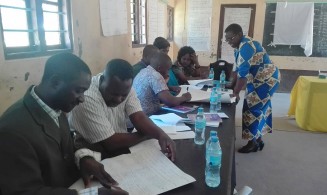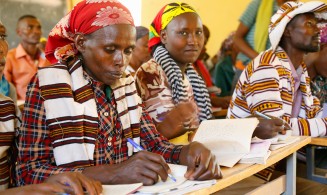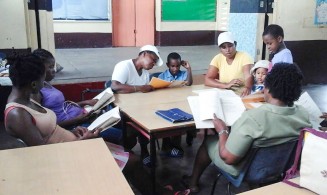

A fellow’s success story – Mr Hassène Slimani: Algeria introduces a new literacy strategy
The National Office for Literacy and Adult Education in Algeria (ONAEA) has adopted a new National Literacy Strategy (NLS), which capitalizes on the successes of and addresses gaps in its predecessor. Some of the components of the NLS are already being implemented, such as the development of a national reference framework of key competencies for adult learners and the promotion of an intergenerational learning approach to literacy.
Mr Hassène Slimani, Director of ONAEA’s Tizi Ouzou office in Algeria, participated in the UNESCO Institute for Lifelong Learning (UIL) CONFINTEA Fellowship Programme in November 2017, where he worked on Algeria’s new literacy strategy with a team of UIL experts. One of the primary objectives of this new strategy is to strengthen the competencies of adult learners by tailoring the content of adult learning and education (ALE) programmes to their needs and to that of the workforce and society. It includes the elaboration of a unified national framework of competencies for adult learners and the promotion of the use of digital technologies to advance distance learning. The strategy, which will run to 2030, aims to halve the number of illiterate adults in the country by 2025.
Informed by the UNESCO 2015 Recommendation on Adult Learning and Education (RALE), Algeria’s new NLS adopts a lifelong learning approach and, as such, embraces the concept of learning as a continuum, from basic literacy to vocational training and human resource development. It targets not only illiterate adults but also those with low levels of literacy and those who, for various reasons, have not embarked on the path of lifelong learning.
One of the aims of the new NLS is to reshape the national discourse on illiteracy, which is traditionally seen as something negative to be eradicated, in order to promote a new approach that sees literacy as an investment in human resource. This calls for national recognition of the power and potential of adult learning for effectuating Algeria’s sustainable future.
‘After my participation in the CONFINTEA Fellowship Programme, I shared what I learned at UIL with key stakeholders responsible for literacy and adult education in Algeria,’ explained Mr Slimani. ‘My aim was to contribute to the strengthening of national capacities in the field in implementation, monitoring, and evaluation of literacy policies and programmes. Mr Slimani added that his participation in the programme also provided him with new competences and knowledge of the field of adult and lifelong learning, which he uses to inform his department at the ministry.
To secure the success of the new NLS, ONAEA plans to hold information campaigns with its institutional partners, civil society organizations, learners and teachers. A major training programme for the country’s adult education facilitators is also in development.
From 2011 to 2017, UIL welcomed 38 fellows (19 men and 19 women, 31 of whom were government officials and 7 NGO representatives) from 32 countries. The last cycle was organized in November 2017.







